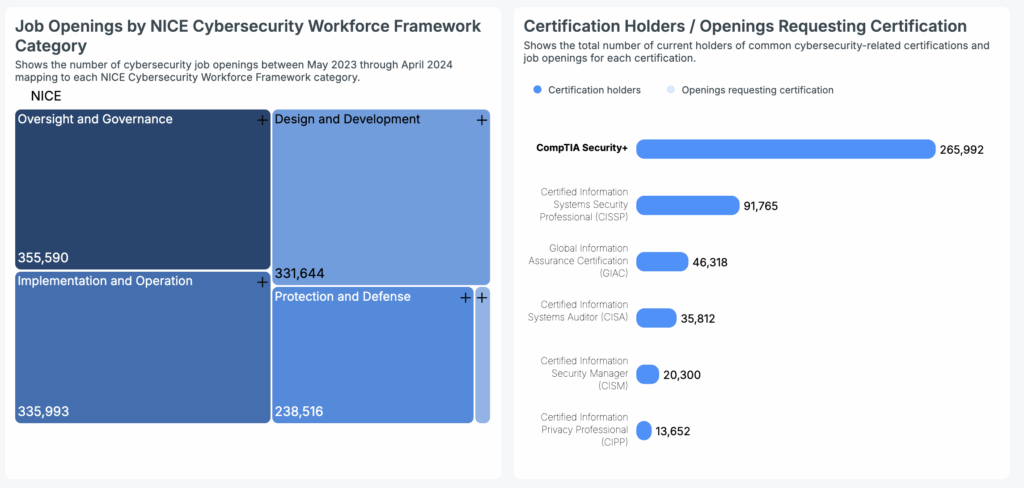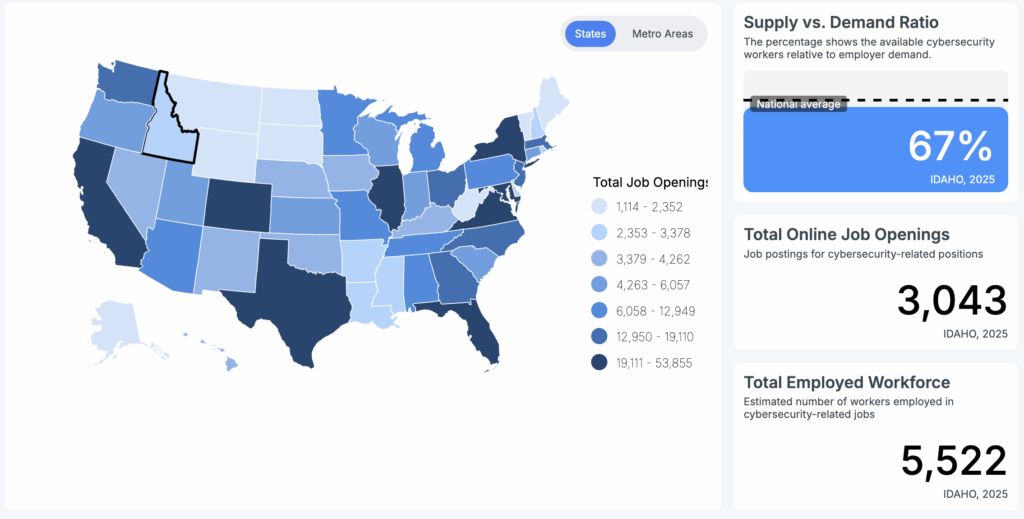- Associate degrees
- Bachelor’s degrees
- Master’s degrees
- PhD degrees
- Cybersecurity certifications
- Cybersecurity jobs
The following guide summarizes cybersecurity degree programs in Idaho. The guide also includes basic information about the cybersecurity industry in Idaho.
Idaho is richly endowed with beautiful mountains, rivers, and other natural wonders that have long made it a favored playground for vacationers and adventurers.
Ad
cybersecurityguide.org is an advertising-supported site. Clicking in this box will show you programs related to your search from schools that compensate us. This compensation does not influence our school rankings, resource guides, or other information published on this site.
Featured Cybersecurity Degree Programs
| School Name | Program | More Info |
|---|---|---|
| Southern New Hampshire University | Online BS in Cybersecurity or Online MS in Cybersecurity | website |
| Grand Canyon University | Online BS in Cybersecurity or Online MS in Cybersecurity | website |
| Eastern Oregon University | Online BS in Cybersecurity | website |
| UC Berkeley School of Information | Master’s in Cybersecurity | No GRE/GMAT Required | website |
| Purdue Global | Online BS in Cybersecurity | website |
Traditionally, tourism has made up a large part of Idaho’s economy. But, in the last several decades, Idaho’s economy has been driven by science and technology companies.
Electronic products and components account for as much as three-quarters of the state’s exports. Micron Technology and Sun Microsystems both maintain headquarters in Idaho, although Sun is now owned by Oracle Corporation. Hewlett-Packard also still makes laser printers there.
Other industry sectors employing much of Idaho’s workforce include professional and business services, trade and transportation, healthcare and education, and government.
So while the cybersecurity workforce in Idaho is small today, there are ample high-value targets for cybercriminals. Demand for information security services is therefore growing and will continue to do so.
Cybersecurity climate in Idaho
The cybersecurity community in Idaho is relatively small, but still active and engaged. There are several regular meeting venues.
For example, the annual Idaho Cybersecurity Interdependencies Summit is a series designed for cybersecurity professionals as well as people from any organization wishing to learn more about the threats to our data, systems, and networks. It is intended to
“build public-private partnerships and advance Idaho’s resilience to cyber threats.”
The Idaho National Laboratory in Idaho Falls, Idaho, is home to one of the nation’s primary cybersecurity facilities. INL is part of the US Department of Energy and conducts scientific and technological research on a broad range of specialties. Cybersecurity is one of those specialties.
The facility’s security efforts focus on protecting critical infrastructure, and cybersecurity is one major component of these efforts. It also provides educational programs and grants for K-12 students engaged in STEM topics.
Also in Idaho Falls, a group of cybersecurity professionals has dedicated itself to establishing BSides Idaho Falls. BSides is a worldwide movement consisting of individual local chapters.
The intent is to create community-driven frameworks for organizing events to engage all who are interested in an educational and networking interaction surrounding the latest issues in cybersecurity.
The tiny town of Idaho Falls seems an unlikely place for such an effort, but likely because of the existence of INL there, it is becoming an increasingly active group that attracts participants from all over the northwest region of the US.
Cybersecurity education in Idaho
There aren’t a large number of options available for cybersecurity degrees and certifications offered by Idaho educators yet. Statewide, just 13 programs in total have been developed to date. However, at least one school has assembled significant cybersecurity resources.
Established by the Idaho State Board of Education, the Center for Secure and Dependable Systems (CSDS) was developed by the University of Idaho within its Department of Computer Science. CSDS “supports and coordinates research and education in information assurance and cyber defense.”
Created in 1999, CSDS received funding in 2012 to conduct cybersecurity research. It does so in partnership with private industry in Idaho. The National Security Agency and the Department of Homeland Security have designated UI’s CSDS as a National Center of Academic Excellence in Cyber Defense (CAE-CD).
The UI CSDS faculty has also secured funding from the National Science Foundation for the Scholarship for Service Program. The program provides students the opportunity to work for the federal government in exchange for having their college costs paid.
CSDS also holds an annual Cybersecurity Symposium. And every year, UI’s Department of Computer Science enters teams of students in the U.S. Department of Energy’s annual CyberForce Competition.
Related resources
Cybersecurity associate degrees in Idaho
The cybersecurity workforce is growing rapidly, but the demand for qualified experts is growing even more quickly.
Cybersecurity is an extremely technical profession requiring a broad knowledge of all things computers, as well as cybersecurity specialties. Thus, bachelor’s degrees are a minimum qualification for most information security career paths.
In part due to the shortage of cybersecurity professionals, however, there are still many entry-level positions offered by employers willing to hire candidates with a two-year associate’s degree. Once firmly established in a cybersecurity career, however, professionals will be well served by returning to school to complete a bachelor’s degree program.
There are now three campus-based cybersecurity associate’s degree programs on offer from Idaho schools. See the list below for more details.
- Program: Associate of Applied Science in Cisco Networking and Security Technologies
CAE designation: CAE-CD
Credits: 60
Cost per credit: $278 in state | $361 out of state
Delivery Method: Campus
Learn more: Program details - Program: Associates Degree in Industrial Cybersecurity Engineering Technology
CAE designation: CAE-CD
Credits: 69-72
Cost per credit: $232 in state | $763 out of state
Delivery Method: Campus
Learn more: Program details - Program: Associate of Applied Science in Cybersecurity Information Security (INFOSEC) Administration
Credits: 64-67
Cost per credit: $142 in state | $364 out of state
Delivery Method: Campus
Learn more: Program details
Cybersecurity bachelor’s degrees in Idaho
Being on the front lines of cybersecurity defense operations today requires a broad knowledge of systems, networks, programming, and data storage. This level of knowledge comes only with extensive education, training, and experience.
So it’s not too surprising that most cybersecurity careers today require at least a bachelor’s degree in some technological discipline. Most STEM-related degrees are often acceptable to employers in a job market where it’s difficult to find qualified candidates.
However, a bachelor’s degree in a cybersecurity specialty will provide a decided advantage, not only in the job hunt but in getting acclimated to the real world of cybersecurity.
At present, there is only one cybersecurity bachelor’s degree minor available from Idaho colleges and universities.
- Program: Bachelor’s of Science in Computer Science – Cyber Security Minor
CAE designation: CAE-CD
Credits: 120
Cost per credit: $252
Delivery Method: Campus
Learn more: Program details
Cybersecurity master’s degrees in Idaho
The nature of cybersecurity is that it is ever-changing. It’s a constant cat-and-mouse game between hackers and those protecting the data, systems, and networks of organizations around the world.
What this means is that the cybersecurity world requires unceasing technological advancement. Increasingly, educational institutions, cybersecurity companies, and infosec think tanks are researching to continually move the defense of data forward.
Cybersecurity professionals engaged in such research are often seeking out master’s degrees. This is particularly true of educators. In addition, senior corporate information security executives often find it beneficial or even necessary to complete a master’s degree in cybersecurity.
- Program: Online Master in Cyber Operations
CAE designation: CAE-CD
Credits: 30
Cost per credit: $525
Delivery Method: Online
GRE/GMAT Required: Not Required
Learn more: Program details - Program: MS in Computer Science – Information Assurance
CAE designation: CAE-CD
Credits: 30
Cost per credit: $368 in-state | $1,623 out of state
Delivery Method: Campus, Online
GRE/GMAT Required: Not Required
Learn more: Program details
Cybersecurity PhD degrees in Idaho
As is the case with many career categories, cybersecurity Ph.D. programs are largely desirable for those working in academia or research applications. Some high-level corporate professionals are seeking doctorate degrees in cybersecurity.
The University of Idaho also provides the state’s only cybersecurity Ph.D. program, a campus-based degree: Ph.D. in Computer Science – Information Assurance. No online cybersecurity Ph.D. programs are being offered by Idaho schools at present.
- Program: Ph.D. in Computer Science – Information Assurance
CAE designation: CAE-CD
Credits: 78
Cost per credit: $586 in state | $1655 out of state
Delivery Method: Campus
GRE/GMAT Required: Not Required
Learn more: Program details
Cybersecurity certifications in Idaho
From May 2023 to April 2024, the cybersecurity sector in the U.S saw significant demand, totaling over 1.2 million job openings.
Oversight and Governance led with 355,590 positions, followed by Implementation and Operation (335,993) and Design and Development (331,644). Protection and Defense roles accounted for 238,516 openings, while Investigation had 19,525.

Certification programs in technological specialties are now being offered for a variety of audiences for several purposes.
Cybersecurity is one such specialty. Students can find certification programs that provide an introduction to a range of knowledge areas required for most jobs.
There are also certifications for certain specialists seeking to advance and update their knowledge of a chosen niche. And many cybersecurity certification programs are now designed to supplant, at least temporarily, complete degree programs.
Here’s a look at the current number of professionals holding common cybersecurity certifications nationwide, according to Cyberseek’s data:
- CompTIA Security+: 265,992 certification holders
- CISSP): 91,765 certification holders
- GIAC): 46,318 certification holders
- CISA): 35,812 certification holders
- CISM: 20,300 certification holders
- CIPP: 13,652 certification holders
Whatever the need, students and professionals can benefit greatly from completing as many certifications as possible, both for resume building and the growth of skills and knowledge.
There are now four cybersecurity certificate programs available in Idaho. See the list below for more information.
- Program: Cryptology Security Analyst Graduate Certificate
CAE designation: CAE-CD
Credits: 12
Cost per credit: $510 in state | $941 out of state
Delivery Method: Campus, Online
Learn more: Program details - Program: Advanced Technical Certificate in Cybersecurity
CAE designation: CAE-CD
Credits: 57
Cost per credit: $139 in state | $306 out of state
Delivery Method: Campus
Learn more: Program details - Program: Graduate Certificate in Secure Cyber Operations
CAE designation: CAE-CD
Credits: 12
Cost per credit: $495 in state | $1544 out of state
Delivery Method: Campus
Learn more: Program details - Program: Cybersecurity and Networking Basic Technical Certificate
Credits: 20
Cost per credit: $142 in state | $364 out of state
Delivery Method: Campus
Learn more: Program details
Cybersecurity jobs in Idaho
Idaho is on the smaller side in relation to its cybersecurity market. And demand for new infosec experts is currently not outstripping the supply of professionals by as wide a margin as most other states.
Cyberseek reports that the state had 5,522 residents employed in some aspect of information security. Idaho employers advertised 3,043 job openings.
The Boise City area was the most active, showing new demand for 2,391 new workers, followed by Idaho Falls at 157, Coeur d’Alene at 66, and Pocatello with 48 job openings.

Using security analysts as a barometer for the cybersecurity pay scale in Idaho, it seems employers are paying about in line with the relative cost of living in the state. The current average hourly wage, according to the Bureau of Labor Statistics, is $58.64, and the average annual salary is $121,970.
Cybersecurity in Idaho
That the cybersecurity community in Idaho is becoming such an active group speaks to the pervasive and critical nature of information security today.
Even in a state so dominated by the lure of natural beauty and adventure, cybersecurity is essential to 21st-century life and economic health and stability.
The Idaho National Laboratory in Idaho Falls is certainly a contributor to this activity, but so too is the state’s economy. Reliance on technology companies and other organizations vulnerable to cyber attacks should ensure that Idaho’s cybersecurity community continues to grow and thrive in the future.